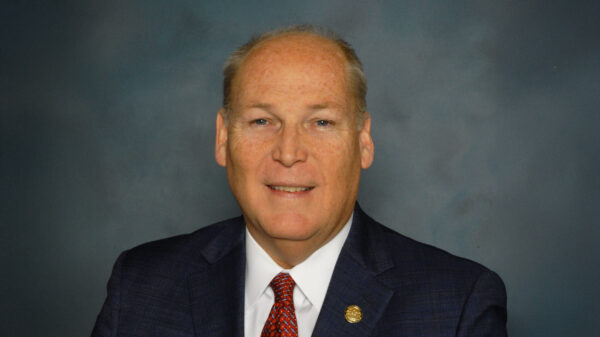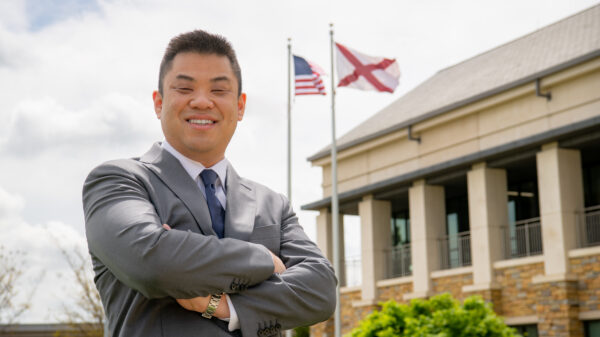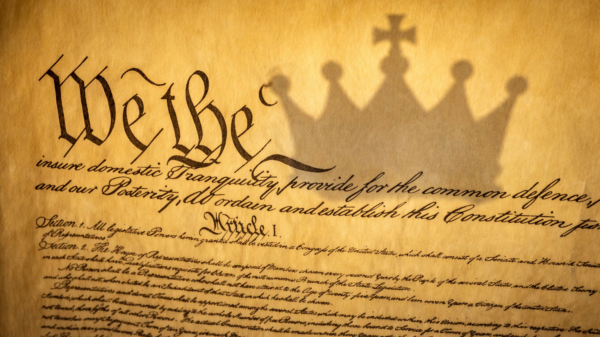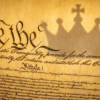Beneath the shadow of old power, Alabamians rose — refusing to kneel. From Montgomery to Mobile, peaceful demonstrators echoed the Declaration’s warning: no leader rules by divine right, and liberty must never bow to a crown.
In Montgomery this weekend, they stood on the steps of the Alabama Department of Archives and History, just across from the Capitol — a building once used to defend segregation, now looming behind those gathered to defend democracy. From Mobile to Huntsville, from Auburn to Birmingham, the message echoed loud and clear: “No kings.”
This wasn’t just a protest — it was an alarm bell rung by citizens who know what happens when freedom is taken for granted.
Peaceful resistance has always been part of the American story. Before Lexington and Concord, there were boycotts, petitions and pamphlets. Our Revolution didn’t begin with a gunshot — it began with a refusal. A refusal to bow. A refusal to be ruled by divine decree. That same spirit is alive in every marcher who stepped forward this weekend to oppose the growing authoritarianism in American politics.
Too many forget that the Declaration of Independence is not just a historical document — it is a blistering indictment of unchecked power. It declares, without hesitation, that “when a long train of abuses and usurpations” reveals a pattern of tyranny, “it is the Right of the People to alter or to abolish it.” It is not shy about its target: “A Prince… is unfit to be the ruler of a free people.”
That was a direct rejection of monarchy. A full-throated denial of the divine right of kings. And yet, nearly 250 years later, some in this country speak of presidents as if they are ordained by God Himself—untouchable, unquestionable, beyond reproach. That belief may comfort the power-hungry, but it is poison to the republic.
It’s not just dangerous. It’s anti-American.
The founders didn’t whisper about tyranny. They called it by name and risked everything to defeat it. And they didn’t do it so we could one day trade red coats for red hats and mistake loyalty to a man for loyalty to a nation. They built a system where no one is above the law — not kings, not governors, not presidents.
Here in Alabama, we’ve seen what resistance looks like. This is the land of Selma, the home of the Edmund Pettus Bridge. The soil is heavy with the footsteps of those who marched, bled, and were beaten for the right to be heard. Now, a new generation is taking to the streets — not with violence, but with the force of history behind them.
They are not asking for favors. They are demanding accountability. As Tuscaloosa protester Heather Love of Indivisible West Alabama put it, they are “pushing back against the rise of an authoritarian government” because they see “more and more power being hoarded by the executive branch and a fall away from the democratic principles America stands for.”
They see clearly what some in power hope the rest of us will ignore: that the concentration of power in one man, cheered on by a political cult and cloaked in religious language, is not leadership. It’s idolatry. It’s what our ancestors fled. It’s what they revolted against.
And still, the enablers preach submission. They invoke God’s will to justify cruelty, corruption and control. As if liberty is a threat. As if dissent is disloyal. As if the people should kneel, not stand.
Consider former Alabama Chief Justice Tom Parker, who served until January 2025. While still in office, he declared in a podcast interview, “God created government, and the fact that we have let it go into the possession of others, it’s heartbreaking.” That wasn’t just a theological aside — it was a clear expression of a worldview in which government belongs not to the people, but to those who claim divine endorsement.
That is not the American tradition. That is the divine right of kings, dressed in a judicial robe.
We rejected kings then. We reject them now.
What the No Kings protests made clear — across Alabama and across the country — is that democracy isn’t self-sustaining. It must be claimed, defended and lived out. It requires vigilance. It demands courage. And sometimes, it demands defiance.
The Declaration still speaks. It tells us that no man rules by divine right. That liberty belongs not to rulers, but to the ruled. That the authority of government must always bend to the will — and the dignity — of the people.
The road from Selma is not finished. It turns now to Montgomery, to Mobile, to us.
History is watching. So are our children. If we believe in liberty, now is the time to prove it — loudly, peacefully and without apology.



















































